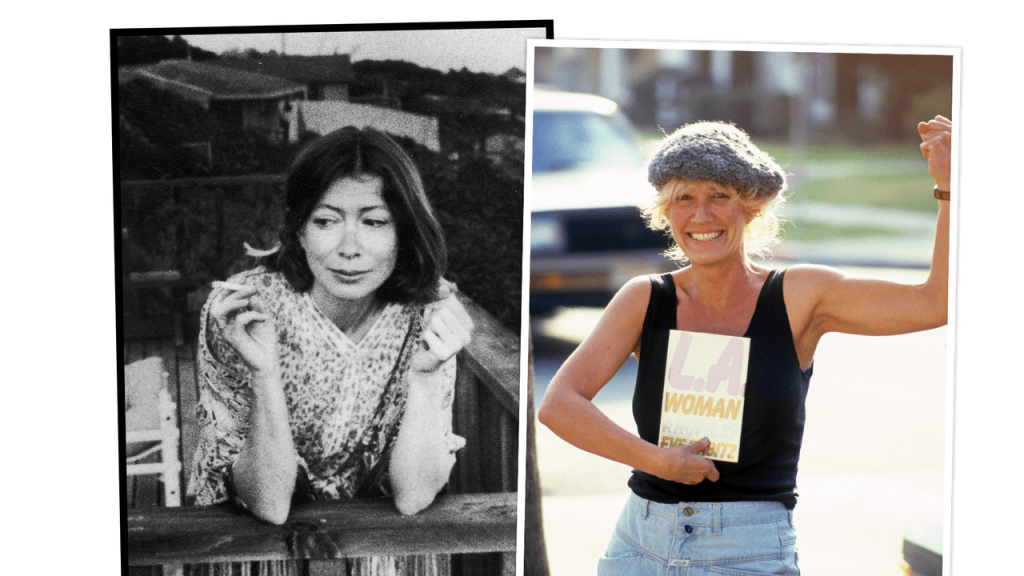The thing about a love affair is that even when you think you’re free of it, the right words from the right person can yank you right back in. Lili Anolik, the VF contributing editor responsible for the writer Eve Babitz’s late-in-life popularity—she chronicled Babitz’s life and literary exploits not only in this magazine but also in the 2019 book Hollywood’s Eve—thought that the author’s death in 2021 was the end of that pursuit. Then Babitz’s sister found a box of unsent letters in the back of her closet, one of which read: “Could you write what you write if you weren’t so tiny, Joan?”
Anolik was thrown back into the louche and love-worn Babitz trenches. This time, she was peeping in on a pas de deux: the decades-long frenemyship between two very different writers—and two very different women. The result, Didion & Babitz, digs into the hidden history of Didion’s early great love (also published first in a VF article) and her path to publication, while further illuminating Babitz’s complex psyche regarding her art, her sex life, and their connection.
As the paperback edition of Didion & Babitz hits shelves today, Anolik talks all things Babitz and Didion—and lets us in on her own personal “pecker meter.” (You’ll have to read on to understand what she means.) “I have this with men too, that I get fascinated with, but particularly with women, I want to know how they did it,” Anolik tells me. “Joan is so big, she blots out the sun…. With these letters, I could start to pick the lock of Eve, but also of Joan.”
This interview has been edited for length and clarity.
Why didn’t Babitz send these letters? Why did she keep all of them?
I’m such a Janet Malcolm freak. In that great Sylvia Plath book, she talks about the genre of the unsent letter. Everybody writes letters that they tear up or trash, but to write the letter and save the letter, you’re writing it to posterity. They basically function like a diary because Evie seems like such an unashamed, straight-up, open person, just totally unguarded emotionally. Any question I asked her, she would always answer. I think that she felt that whining or bitching was a violation of her style, so of her code. She would never do it. That meant she never talked to you about what was hard for her or difficult or painful. But she put all of that into letters.
So that first letter that I pulled up, that letter to Joan, was revelatory.
The book isn’t Joan versus Eve; it’s more complicated than that. But it does set up that they are two very different women, even though they share certain aspirations. How did you think about that when you were writing about them?
They seemed simultaneously a pair and a set of opposites, but opposites that were secretly in alignment. Necessary to one another. My own intuition tells me that Joan stopped thinking about Eve, probably, after the ’70s. She regarded Eve as a casualty of the ’70s. Eve technically survived the decade, but she never hit those heights again.
You have more of an affinity for Eve, but do you, personally, feel more aligned to one or the other?
Of course, toward Joan. I have a ponytail. I went to Princeton. A Jewish doctor husband. I mean, obviously, I’m on the Joan side.
Frankly, I don’t really feel like either one of them. Things are so much easier for me when I was born, because Joan is [born in] 1934, and if you wanted to be a writer with a capital W, not a woman writer, not ghettoized in some way, you had to figure out how you were going to operate. I recognize Joan’s excellence as a writer, but her sensibility has never compelled me.
I owe this huge debt to Stephanie Danler [the author of Sweetbitter and Stray]. I knew that Noel Parmantel existed. He was a huge figure in Joan’s background, and mysterious. He doesn’t appear in Griffin [Dunne]’s doc, and he was hard to get hold of. I knew he was in his late nineties. I’d written him, but then I just figured, he’s so old, he’s really not around, or I’m harassing him. I remember Stephanie saying to me—we’re at a coffee shop in Los Angeles, I had just come from the Huntington Library—and she said, ‘You can’t write anything on Joan if you don’t have Noel. She was right. I went back to my hotel room. He was in the White Pages, and I knew he liked women. I knew that that had been part of his nature. I figured if he heard a female voice, I might get lucky. And he was great. I flew back from LA the next day and went out to Connecticut, and I saw him and Vivian, the woman he lived with. I spent months with him.


